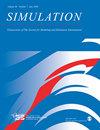Quantifying means-end reasoning skills in simulation-based training: a logic-based approach
IF 2
4区 工程技术
Q4 COMPUTER SCIENCE, INTERDISCIPLINARY APPLICATIONS
Simulation-Transactions of the Society for Modeling and Simulation International
Pub Date : 2022-05-11
DOI:10.1177/00375497221095070
引用次数: 1
Abstract
We develop a logic-based approach for designing simulation-based training scenarios. Our methodology embodies a concise definition of the scenario concept and integrates the notions of training goals, acceptable versus unacceptable actions and performance scoring. The approach applies classical artificial intelligence (AI) planning to extract coherent plays from a causal description of the training domain. The domain- and task-specific parts are defined in a high-level action description language A L . Generic causal and temporal logic is added when the causal theory is compiled into the underlying Answer Set Programming (ASP) language. The ASP representation is used to derive a scoring function that reflects the quality of a play or training session, based on a distinction of states and actions into green (acceptable) and red (unacceptable) ones. To that end, we add to the casual theory a set of norms that specify an initial assignment of colors. The ASP engine uses these norms as axioms and propagates colors by consulting the causal theory. We prove that any set of such norms constitutes a conservative extension of the underlying causal theory. With this work, we hope to lay the foundation for the development of design and analysis tools for exercise managers. We envision a software system that lets an exercise manager view all plays of a tentative scenario design, with expediency information and scores for each possible play. Our approach is applicable to any domain in which means-ends reasoning is pertinent. We illustrate the approach in the domain of crisis response and management.量化意味着基于模拟训练的最终推理技能:基于逻辑的方法
我们开发了一种基于逻辑的方法来设计基于模拟的训练场景。我们的方法体现了场景概念的简明定义,并集成了训练目标、可接受与不可接受的行动和绩效评分的概念。该方法应用经典的人工智能(AI)计划,从训练域的因果描述中提取连贯的游戏。特定于领域和任务的部分用高级动作描述语言L定义。当因果理论被编译成底层的回答集编程(ASP)语言时,将添加通用因果和时序逻辑。ASP表示用于派生反映游戏或训练过程质量的评分函数,基于将状态和动作区分为绿色(可接受)和红色(不可接受)。为此,我们在休闲理论中添加了一组规范,这些规范指定了颜色的初始分配。ASP引擎使用这些规范作为公理,并通过咨询因果理论来传播颜色。我们证明了任何一组这样的规范构成了潜在因果理论的保守延伸。通过这项工作,我们希望为运动管理者设计和分析工具的开发奠定基础。我们设想了一个软件系统,可以让练习经理查看一个暂定场景设计的所有游戏,并为每个可能的游戏提供便利信息和分数。我们的方法适用于任何手段-目的推理相关的领域。我们说明在危机应对和管理领域的方法。
本文章由计算机程序翻译,如有差异,请以英文原文为准。
求助全文
约1分钟内获得全文
求助全文
来源期刊
CiteScore
3.50
自引率
31.20%
发文量
60
审稿时长
3 months
期刊介绍:
SIMULATION is a peer-reviewed journal, which covers subjects including the modelling and simulation of: computer networking and communications, high performance computers, real-time systems, mobile and intelligent agents, simulation software, and language design, system engineering and design, aerospace, traffic systems, microelectronics, robotics, mechatronics, and air traffic and chemistry, physics, biology, medicine, biomedicine, sociology, and cognition.

 求助内容:
求助内容: 应助结果提醒方式:
应助结果提醒方式:


